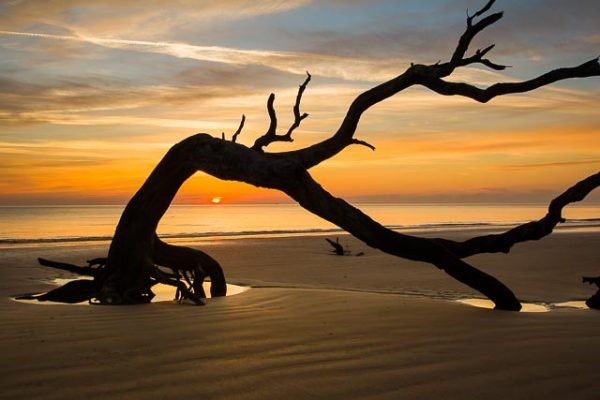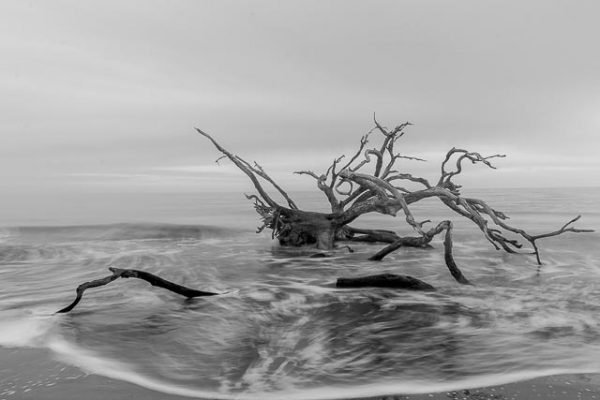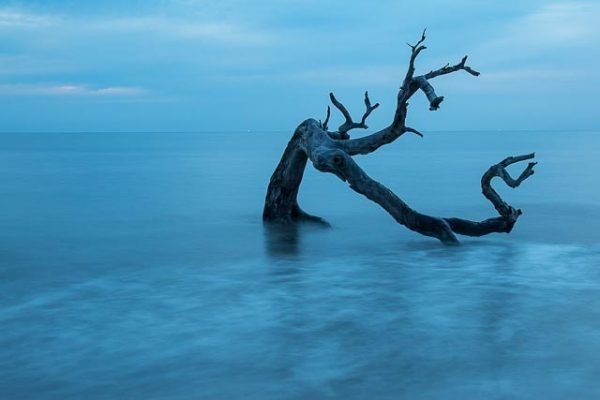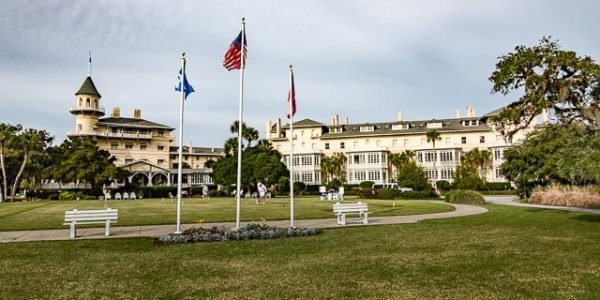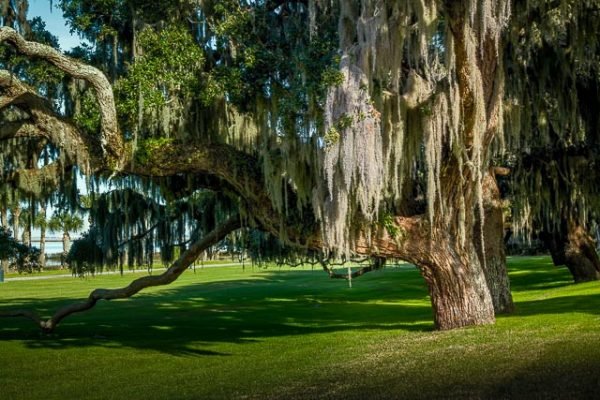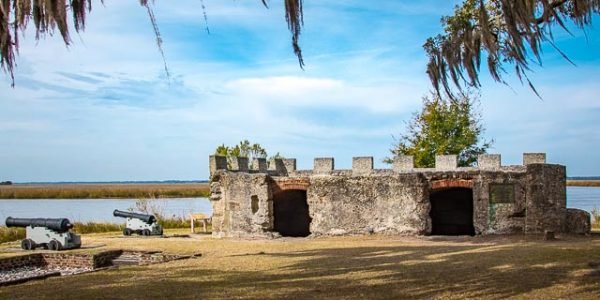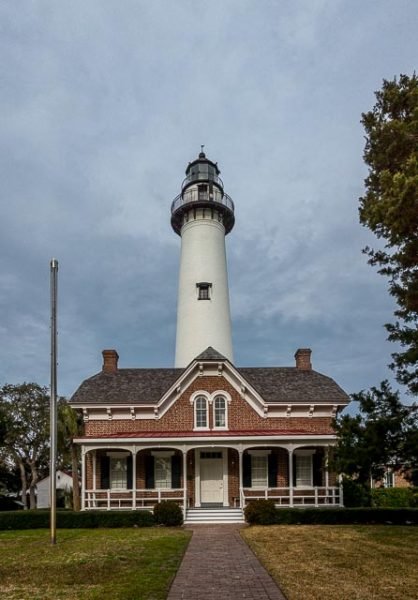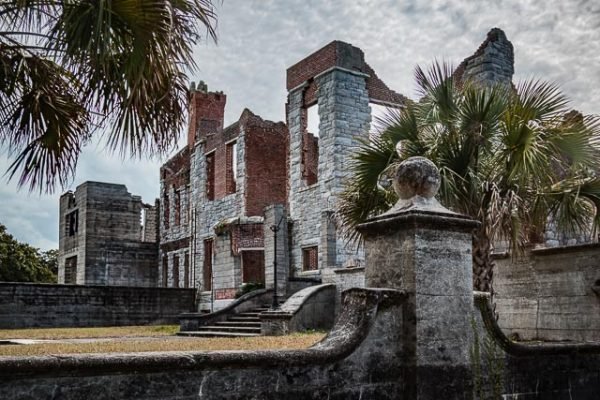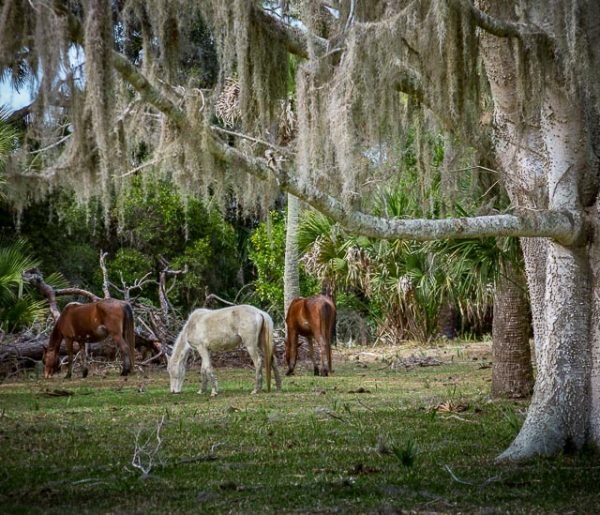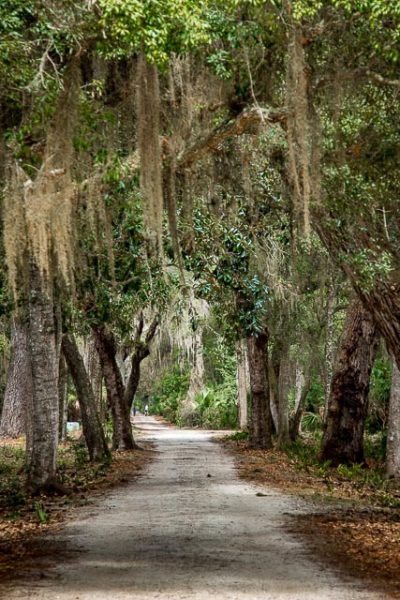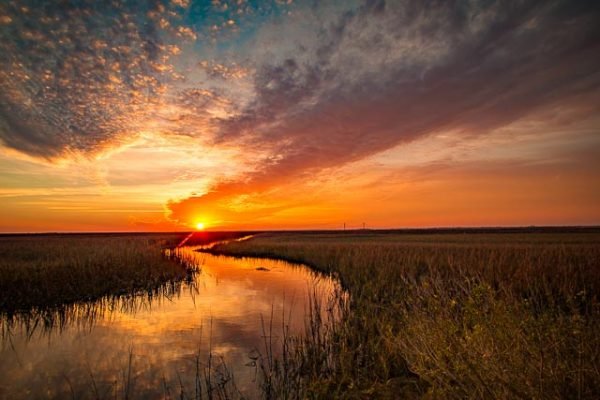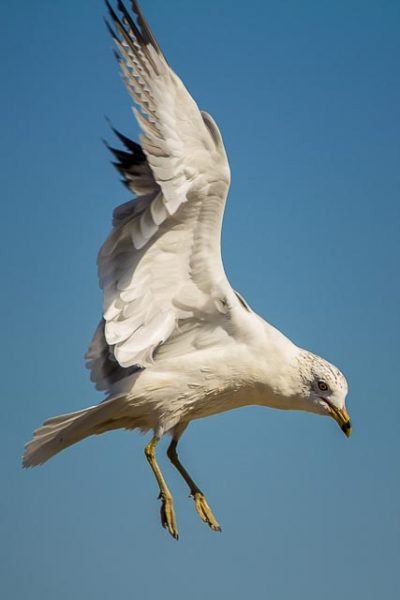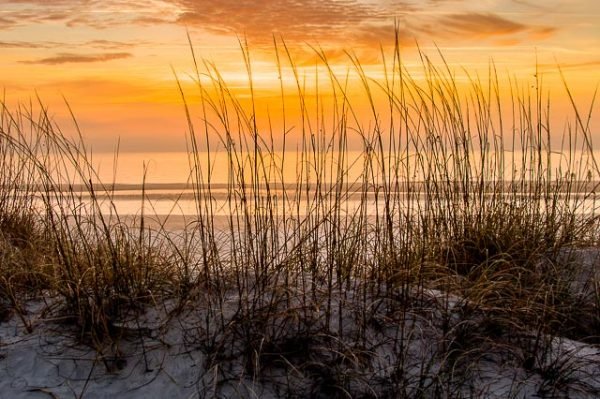Georgia Island Adventure Photography Workshop
February 24-28, 2020
Nestled on the Georgia coast, midway between Savannah, GA, and Jacksonville, FL, lies four beautiful barrier islands: St. Simons Island, Sea Island, Jekyll Island, Little St. Simons Island and the mainland city of Brunswick. Pristine stretches of marshland, punctuated by small islands known as hammocks, define the breathtaking landscape and create the appearance of a continuous stretch of land reaching out to the barrier islands.
During this 5 day 4 night workshop we will visit sprawling beaches, driftwood skeletons, live oaks dripping with Spanish Moss, historic ruins of unimaginable wealth, ancient maritime forests, wide marshes, a national seashore, a designated wilderness, a lighthouse, and an old fort. All of this and much more with a great break from winter with normal daytime temperatures in the mid 60’s.
The focus of this landscape-based workshop is in the field shooting with one on one instruction. We will work with Neutral Density filters for long exposures on the world famous tree strewn Driftwood Beach on Jekyl Island, which is also an excellent location for the sunrise and studying what makes for a good composition. We will be photographing a great variety of subjects and learning many techniques.
Locations:
Jekyll Island
Driftwood Beach
Located on the north end of Jekyll Island, Driftwood beach will amaze you with the beautiful driftwood and trees that resemble a scene from another world. These gnarled and weathered trees are left behind from years of erosion. Driftwood beach offers a wonderful location for photographs

Driftwood Beach on Jekyll Island Georgia, is a tree graveyard creating amazing ocean views at sunrise. Long exposure creates a surreal image by blurring the moving water with a misty dramatic and unique feel.
JEKYLL ISLAND NATIONAL HISTORIC DISTRICT
At first, it was the farm and home of John Eugene duBignon. But, with the help of his brother-in-law Newton Finney, it became what Munsey’s Magazine called “the richest, most inaccessible club in the world” – the Jekyll Island Club.
Club members included men such as J.P. Morgan, Joseph Pulitzer, William K. Vanderbilt, and Marshall Field, to name only a few. Members prized the island for its “sense of splendid isolation,” as well as its beautiful landscape and moderate climate. At a time when the idea of a modern seaside resort was still a novelty, members experienced levels of luxury and service that were remarkable, even by today’s standards.
Jekyll Island History
Jekyll Island’s history begins some 3,500 years ago. Prior to British colonization, the islands first inhabitants were Native Americans. General James Oglethorpe founded the colony of Georgia in 1733, and along with it, Jekyll Island. The island was named for Sir Joseph Jekyll, a financial supporter of the colony.
Major William Horton was appointed by General Oglethorpe to build an outpost on Jekyll Island to protect Fort Frederica on St. Simons Island. The island was home to prosperous plantations until the end of the Civil War.
Jekyll Island was purchased in 1886 by a group of wealthy families as a private retreat. By 1900, The Jekyll Island Club membership included the Rockefellers, Morgans, Cranes and Goulds and represented over one-sixth of the world’s wealth. The Club closed in 1942 and Jekyll Island was purchased by the State of Georgia in 1947.
St. Simons Island
Fort Frederica National Monument, on St. Simons Island, Georgia, preserves the archaeological remnants of a fort and town built by James Oglethorpe between 1736 and 1748 to protect the southern boundary of the British colony of Georgia from Spanish raids. About 630 British troops were stationed at the fort.
A town of up to 500 colonial residents had grown up outside the fort; it was laid out following principles of the Oglethorpe Plan for towns in the Georgia Colony. The town was named Frederica, after Frederick, Prince of Wales, son of King George II. The monument was listed on the National Register of Historic Places on October 15, 1966.
The St. Simons Light is a 104-foot brick structure completed in 1872 and was outfitted with a third-order, biconvex Fresnel lens. The lens is one of 70 such lenses that remain operational in the United States. The rotating lens projects four beams of light, with one strong flash every 60 seconds. A cast iron spiral stairway with 129 steps leads to the galley (or watch/service room.
The Lighthouse is reputed to be haunted by the ghost of lightkeeper Frederick Osborne, who was killed in a duel with assistant keeper John Stephens in early March 1880. In 1934, the kerosene-burning lamp was replaced by a 1000-watt electrical light. On July 1, 1939, the United States Lighthouse Service was placed under the jurisdiction of the US Coast Guard. In 1953 the lighthouse was fully automated.
Cumberland Island National Seashore
Opportunities for photography are endless. Numerous historic structures and ruins scatter the island. At the beach, over the marsh, tangled vines connecting forest canopies to dappled forest floors, jumbles of Saw Palmetto, gnarled live oak limbs, either bare bones dead or filled with abundant plant life, various animals scurrying about, and interesting cultural and natural features, all provide excellent subjects for photos.
We will photograph the ruins of a mansion that was once called Dungeness. First built in 1884, the Dungeness Mansion was intended as a winter home for Thomas Carnegie (younger brother and business partner of Andrew Carnegie), his wife Lucy, and their 9 children. Though Thomas passed away soon after construction, Lucy Carnegie went on to spend more and more time and resources on the island estate. Several additions and remodels were made over the next thirty years. By the time Lucy passed in 1916 the mansion had grown to approximately 35,000 square feet. The mansion caught fire in 1959 and only the brick and stone walls remain.
Wild horses on Cumberland Island National Seashore . During their history on the island horses have been managed as both free-ranging and corralled livestock. By the mid-1900s horses were roaming the island with little or no care provided from island residents. Cumberland has the only herd of feral horses on the Atlantic coast that is not managed (no food, water, veterinary care, or population control). The herd is affected by all the natural stressors faced by native wildlife.
Proposed Workshop Itinerary
February 24 – 28
Georgia Island Adventure Photography Workshop
Monday February 24
Arrive in Brunswick Georgia and meet for dinner at 6:00 pm (Location to be determined at a later date) and a get acquainted session and make arrangements for travel to our morning shoot on Tuesday.
Tuesday February 25
Sunrise at Driftwood Beach
Explore Jekyll Island
Wednesday February 26
Sunrise at Driftwood beach
Explore St. Simons Island
Thursday February 27
Drive to St. Marys
Depart for Cumberland Island at 9:00
Return at 4:45 pm
Must take lunch and water bottle, will need to carry everything you take, we can choose as a group to do a van historical tour or a walking tour of the island.
Friday February 28
Sunrise Photo Shoot and then conclude the workshop with with breakfast and any follow up questions or critique of work.
Cost
The workshop fee will $1195.00 per participant.
The workshop fee includes all lectures, fieldwork and critiques of your images during our sessions. This is a photography workshop, not just a photo tour, my goal is provide as much personal hands on help as possible. I will check with each participant to see how you are doing and if you need help, if you wish for assistance let me know, if not just let me know, and you will be free to shoot on your own.
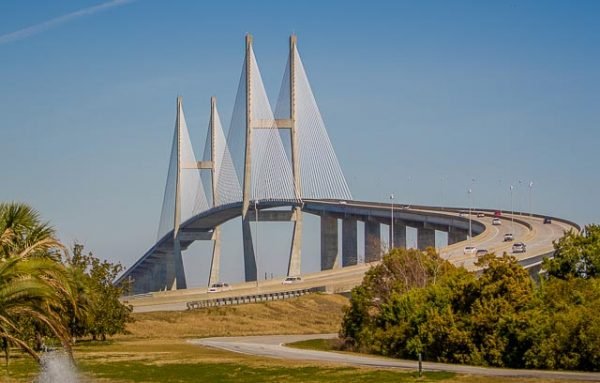
The Sidney Lanier Bridge is a cable-stayed bridge that spans the Brunswick River in Brunswick, Georgia, carrying four lanes of U.S. Route 17. It is currently the longest-spanning bridge in Georgia and is 480 feet tall. It is also the seventy-sixth largest cable-stayed bridge in the world. It was named for poet Sidney Lanier.
Workshop Policies and Information
About the Workshop
Our workshops are based on digital photography, the assistance that I can provide and the immediate feedback of digital make “in the field” workshops one of the most effective teaching formats available. Whether finding the correct exposure, looking through the viewfinder for the perfect composition, or learning how to use the equipment, you can’t beat real world experience. Classes are kept small, it’s all about personal, individual attention. Digital offers a number of benefits for learning photography including:
- Immediate feedback on exposure and composition
- Immediate critique from the instructor an other participants
- Ability to do reviews and projection
- Automatically capturing all shooting information (Meta Data)
- Ability to manage work flow while still on location
Workshop Itinerary
Changes to the Itinerary
In order to offer the best experience possible for the workshop participants we reserve the right to alter the itinerary when our judgment warrants it. This could be due to unforeseen circumstances, closures, weather or other conditions beyond our control. We may also alter due to new or unexpected photographic opportunities that may arise.
What is Included
Your workshop fees include full instruction and location guiding. Entrance fees to Jekly Island
What is Not Included
Transportation to and from the workshop, lodging, meals, incidental expenses, gratuities, and items of a personal nature are not included. My philosophy on lodging and meals is that by not including them in the workshop each participant is free to choose their own level of accommodation and choice of meals. I have some participants stay in high end motels, while others prefer camping or RV’s. We will often choose to eat as a group for convenience and to carry the conversation during our meal break.
If the group decides to take the van tour of Cumberland that will run $50 per person.
Lodging
Lodging is not included in the workshop fee. We will spend 4 nights in Brunswick Georgia giving us a central location for our adventures.
I will be staying at:
Wingate by Wyndham Brunswick
165 Warren Mason Blvd Brunswick, Georgia 31520
+1-912-265-7725
Meals
Meals, drinks, and snacks are not provided, and are the responsibility of the participant. We will generally plan to eat as a group, but you are free to eat on your own if you wish.
Group Size
We keep our group size small, this provides for a high degree of personal attention and a great amount of flexibility in making the workshop the best possible experience for the participants. This workshop is limited to a maximum of 6 participants.
Health and Physical Considerations
All participants should be in generally good health, walking and moderate climbing may be necessary in outdoor workshops and you will be responsible for carrying of your own equipment on location shoots. If you are taking any medications be sure to bring a supply sufficient for the duration of the workshop. If you have any concern about your ability to participate in a workshop please contact us before registering.
Equipment Needed
To get the most from the workshop you should have a Digital Single Lens Reflex (DSLR) or mirrorless camera, tripod and an assortment of lenses. That being said, it is the photographer not the camera that makes the photo. You will need a laptop computer to use, remember to bring all software, drivers, cords, and camera manuals when attending any workshop.
A good sturdy tripod is needed for many of the photos we will be getting, if you do not have one I can provide one for use during the workshop. Driftwood beach is an excellent location for doing long exposure photography and neutral density filters are recommended (I do have some available for loan).
Registration, Payment, and Refund Policy
You can register any way you like, just so I get your information, you can use the online registration, the contact form, email, postal mail, or call me on the phone (479-414-6889) either to register or just ask a question. Registration is done on a first come basis, so register early to secure your space. A deposit of $500 is required to reserve your space, and full payment is due 30 days prior to the workshop. Enrollment is limited in our workshops, so once you have been accepted your participation is important to us – we are counting on you to attend. If you must withdraw from a course, we must receive notice of your cancellation. We do not make refunds on workshop fees. We do not make partial refunds for unused portions or services of a workshop for any reason whatsoever. If we are able to fill your space in the workshop we will give full credit towards another workshop. If we are not able to fill your space we will issue 50% credit towards a future workshop. If there are openings I will accept last minute registrations when possible.
We can accept no responsibility for losses or additional expenses due to delay or changes in the services to be provided. We reserve the right to change our arrangements should conditions necessitate, or to cancel any aspect of the workshop due to exceptional circumstances.
In the unlikely event that we need to cancel a workshop prior to the start date, we will refund all monies paid in full. Notification of our cancellation will be made via either a telephone call or an e-mail to you at least 14 days prior to the beginning of a workshop other than an emergency. We cannot be responsible for phone messages and e-mails not being received in a timely matter due to your service providers. We cannot be responsible for non-refundable airline tickets unused or other travel arrangements because of a workshop cancellation. All workshops have a minimum participation level which must be met or the workshop may be canceled.
Non Photographer (Spouse, significant other, or friend)
We welcome spouses to join you on the workshop experience however “workshop activities” are limited to registered, paid attendees. You may have a non photographer accompany you to all activities but they must pay for the workshop. If they wish to accompany you on the trip but not attend the workshop activities, but stay with you, finding other activities during the day, and meet for meals and social type events that is perfectly acceptable.
Liability Waiver
All participants will be required to sigh a liability waiver before beginning a workshop. As there is always an element of risk in any adventure associated with the outdoors, participants must read the liability release form carefully. Participant’s signed/dated release will certify that said participant is physically fit and capable of participating in outdoor photography exercises in field locations, and is fully and completely aware of any associated risks created by field locations and weather.
Weather
The more the better, at least as far as the photography goes. Workshops will not be canceled and no refunds will be made due to weather, we will not be responsible for any additional costs that may be incurred by weather delays or cancellations due to weather, flight delays, or other. Participants should come to the workshop prepared for all weather conditions.
This time of year in the Golden Isles of Georgia the weather should be very nice with highs in the mid to upper 60’s.
Trip Extensions
We may be able to extend your trip in the area, if you would like more time and personal instruction. Please contact us for more information and rates before the workshop.
Smoking
We prefer that you do not smoke, however if you must please abide by the following guidelines. Smoking is not allowed in or near vehicles, during instructional sessions, during group meals, or at other times when in close quarters with other workshop participants.
